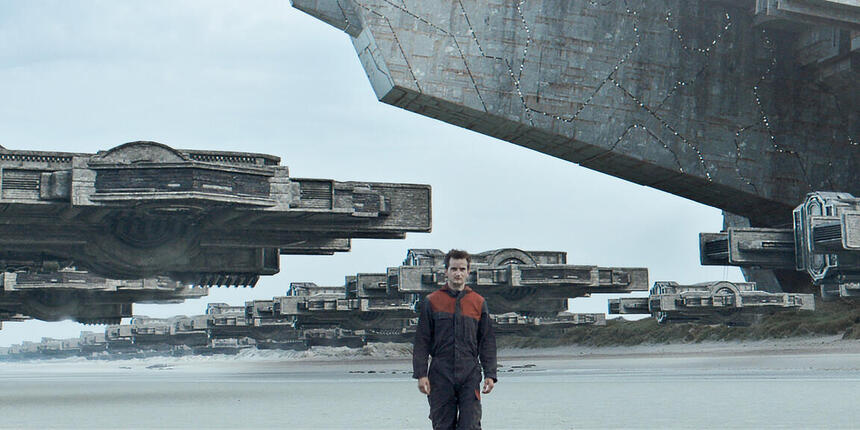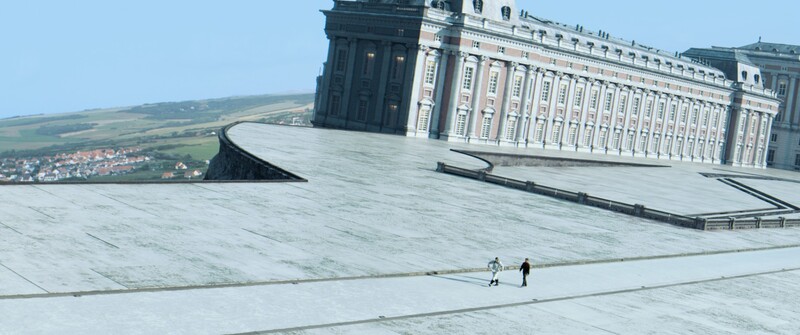Berlinale 2024 Review: THE EMPIRE Merges Cosmic Conflicts with Rural Quirks
Bruno Dumont's latest work is not just another 'Star Wars' parody.

Bruno Dumont, the renowned French filmmaker known for pushing boundaries, delivers an unexpected yet welcome addition to his oeuvre with The Empire.
In this latest work, Dumont daringly merges the grandiosity of space opera with his signature naturalistic, humanistic touch. Set along the picturesque Opal Coast of Northern France, The Empire weaves a curious narrative that juxtaposes extraterrestrial and metaphysical conflict with the unremarkable, anti-climactic daily life of a quaint fishing village.
At its core, the film explores the timeless battle between good and evil, examining this theme not only on a grand cosmic level but also within the nuanced realm of human experience.
The Empire ventures into a daring narrative territory, setting an epic interstellar conflict between the forces of One and Zero against the serene backdrop of Audresselles. This village, already familiar to fans of Bruno Dumont through films like Lil' Quinquin and Coincoin and the Extra-Humans, serves as the battleground for a clandestine war that unfolds both outwardly and within the souls of its residents.
At the heart of the film is a unique child, born from a human and demon, who is fated to play a crucial role in the ensuing cosmic struggle. Named Freddy, this child becomes the focal point for the movie's exploration of contrasts: being versus nothingness, good versus evil, and the carnal versus the spiritual.
Dumont's take on the genre is both irreverent and innovative. He sidesteps the usual conventions of space operas, opting instead for a sophisticated subversion that incorporates his known penchant for naturalism into both visual and storytelling aspects.
This blend of non-professional actors with established stars fosters a sense of realism, anchoring the film's more fantastical elements in a world that viewers can recognize. Such a fusion of the extraordinary with the everyday enables Dumont to probe deep philosophical questions regarding human nature and destiny. He achieves this without compromising the intimate focus on his characters or straying from the iconoclastic humor for which he is recognized.
In The Empire, characters such as the conflicted heroine Jane (Anamaria Vartolomei), representing the forces of light, and the demonic yet human Jony (Brandon Vlieghe), an emissary of evil, encapsulate the film's thematic investigation into duality. Their individual dilemmas are a microcosm of the broader cosmic conflict, bringing an apocalyptic external struggle into a deeply personal realm. Through these figures, Dumont delves into complex themes of morality, identity, and destiny.
The Empire also navigates the duality of form and substance, presenting an intriguing paradox. At first glance, Bruno Dumont's sci-fi venture might be mistaken for a hillbilly Star Wars with its evident tongue-in-cheek approach.
Dumont's approach is far more ambitious, however, transcending superficial comparisons through a bold exploration of the dissonance between the film's form and its actual substance. This juxtaposition is vividly portrayed through characters who engage in elaborate monologues and spirited dialogues on morality, set against the backdrop of a seemingly indifferent, remote fishing village.
The anticipation of grandiose action is met with intentionally anti-climactic outcomes, a method Dumont leverages as a key narrative technique. In this way, The Empire reaches the dimensions of a Shakespearean drama albeit rhetorically.
The production design of The Empire offers a surprising element, especially in its use of special visual effects, which likely pushed the budget to its limits. The detailed depiction of an extraterrestrial fleet over the Opal Coast in Northern France, met with total indifference by the locals, is led by two colossal spaceships: one resembles a floating cathedral, and the other, a flying replica of the Versailles Palace, complete with sprawling, manicured gardens.
The use of sacred and profane architectural motifs as visual metaphors not only adds a layer of pathos to these vessels but also infuses the film with a certain gravitas. Yet, this choice imbues the movie with a Monty Python-esque quality, blending the high-brow with low-brow in a way that is quintessentially Dumont underscoring the director´s trademark iconoclastic approach to cinema.
Dumont's distinctive approach, coupled with the anticipation it generates, has proven to be polarizing. The Empire aligns with the thematic and stylistic canon established by Lil' Quinquin and its successors, featuring familiar faces such as Commandant (Bernard Pruvost) and his loyal sidekick Carpentier (Philippe Jore) in roles that extend beyond mere cameos.
This continuity underscores why The Empire will resonate more with aficionados of Dumont's Northern France saga than with traditional sci-fi enthusiasts. Alongside the incorporation of odd humor, including lightsabers, Dumont utilizes his signature techniques, such as casting local non-professionals and providing them with Shakespearean dialogues. The execution of these lines often falls flat, imbuing the film with a peculiar allure that oscillates between being seen as a deliberate Brechtian alienation effect and the unintended outcome of amateur theater.
The Empire distinctly caters to Dumont´s fans, as its unique presentation may estrange the conventional sci-fi audience. Dumont ventures into new territory, exploring how a space opera and an interstellar metaphysical tale can be approached, redefined, subverted, and even transformed into a slapstick, bizarre farce.
This film is deeply entrenched in Dumont's idiosyncratic and iconoclastic style, making it a challenging ride for those not already acquainted with his work. Yet, The Empire stands out as a rugpulling experience, a low-fi action spectacle with a high-budget execution. It serves as a compelling showcase of how Dumont's neorealist countryside weirdoverse can be further expanded vertically.
The Empire won the Silver Bear Jury Prize at the Berlinale 2024. Kino Lorber picked all the rights for North America with theatrical release planned in late 2024.









